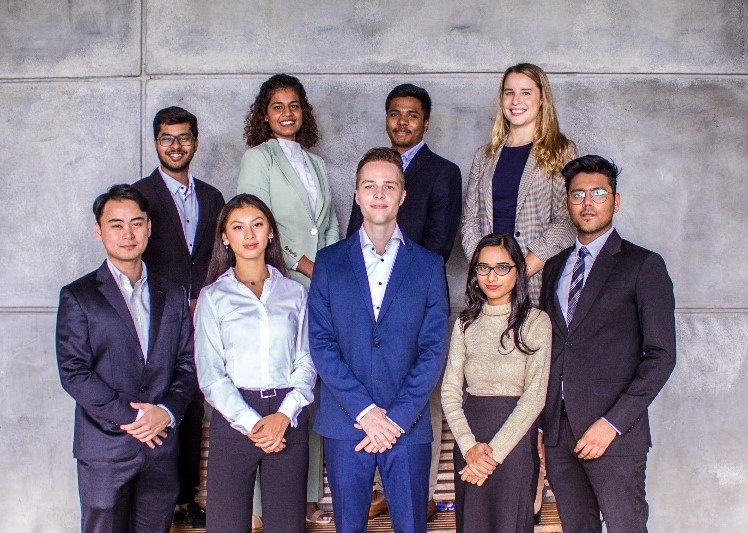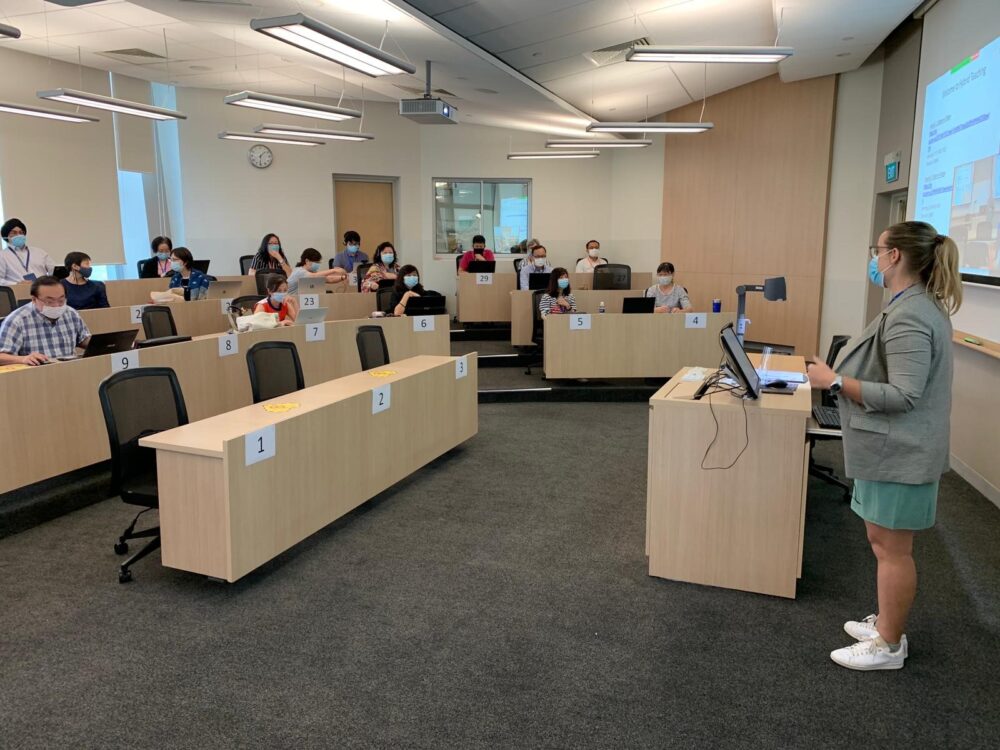From coaching companies in IT processes to coaching professors in adopting hybrid teaching, Kerstin Hoeger has stepped up to the challenge. A student in NUS Business School’s MSc in Management programme, she shares her experience in coaching, learning and hybrid teaching.
Q: Tell us about yourself before coming to NUS Business School.
I did my Bachelor in International Business in a small town called Ravensburg in Germany. After graduation, I moved to the United States for a year to work in a consulting firm called P3. I learnt a lot from projects in the automotive industry, ranging from the commercialisation of undeveloped sites and the digital tracking of work in a manufacturing plant. It was then that my interest in the IT sector grew.

Kerstin Hoeger in a traditional German dirndl.
After moving back to Germany, I stayed in the same company and transferred to their IT division, working on nearshore development of custom-made apps and software. It was really interesting to work in a multinational team (Romania, Serbia, Germany and Netherlands) in an online setting, as we were only seeing each other once a month in person.
We used an agile project management framework called Scrum. The essence of Scrum is, there is no hierarchy. You are in a small team using short iteration loops, so you can always improve your way of working and the product. I was the Scrum Master, which can be translated as the coach of the team. Even now, I am interested in coaching, and started classes to be accredited as an International Certified Coach during the summer.
Working in this engaging environment in Europe in different large companies like Audi and Volkswagen, I got more curious about how this would apply in Asia, as I experienced the cultural differences during my university exchange in South Korea.
Q: Why did you decide to choose NUS Business School?
To get a deeper understanding of Asian countries and culture, I started to look at opportunities to do a Master’s in Asia. After talking to one of my colleagues who already applied for NUS, I became really interested in this university. The MSc in Management programme contains an interesting mix of classes, which tackle a lot of world-relevant topics. I also appreciate the freedom to choose modules.
The location of Singapore was a big plus. I wanted to travel in Asia to experience different countries’ cultures. This did not happen due to the pandemic, but Singapore is culturally diverse, so I experience many different types of Asian cultures here as well.

Kerstin (back row, far right) is part of the Master’s Club team. The student club connects students from the various MSc programmes in NUS Business school.
Q: How did you feel about e-learning, at a time when classes were shifted online due to the circuit breaker?
When the pandemic hit Singapore in early 2020 and the classes all moved online, I felt like we were not really prepared for that. Our first semester started with face-to-face classes and this slowly transitioned to remote online classes as safety measures were implemented. Both students and professors struggled with the different way of teaching.
During the transition period, we learnt to find the best spot in the house with the strongest Wi-Fi connection. Some students returned to their home country. Some had to get up in the middle of the night to participate in class.
For me, I missed the small talk and laughing with the entire class when a professor told a funny joke (I guess still everyone laughed – but we were muted). But I understood that the situation needed this shift to online teaching, to keep everyone safe.
Q: What leads you to teaching the faculty about hybrid teaching?
I planned to do a consulting internship with IBM but all internships were put on hold due to the pandemic. I was sitting at home and thinking about what I could do with my time in Singapore, as well as how my experience with working in an online setting could possibly help someone. I started to have an interesting conversation, about how online teaching could be improved, with Professor Andrew Delios, Vice Dean, MSc Programmes Office. He is an amazing professor who always encourages me to challenge the status quo.
After some discussion, we decided it might be interesting to do a systematic analysis of existing IT tools for online teaching, which could help to enhance students’ learning experience in the next semester (August 2020). In Europe, the semester was still ongoing, so I reached out to a few professors from various universities and analysed their tools and strategies for online teaching.
I also got connected to NUS professors who were teaching in the special term, to get their opinion on tools we found.
After a discussion with the school’s Teaching Excellence Council and members of the deanery, we planned to take small steps forward in hybrid teaching so that students could have the best education experience in the current circumstance. In hybrid teaching, those who can come to school can benefit from the interaction, while observing safe distancing rules. Concurrently, those who were unable or uncomfortable about attending physical classes can participate in the online “live” classes.
There was a lot of preparation before the semester started. I wrote multiple hybrid teaching guides for students and professors, did step-by-step teaching videos, as well as organised a big kick-off with all faculty members.
I am grateful for the support from the Dean’s Office (Deputy Dean Prof Hum Sin Hoon, Lim Pei Ling and Phyllis Kum), as well as the Teaching Excellence Council, especially Associate Professor Siok Tambyah, who always challenges me to think further and come up with better solutions. It was also amazing working with the constant IT support of Douglas Yeo and his team. Dean Andy Rose was really encouraging and supportive, letting me handle the whole project my own way. I am grateful for the great trust he placed in me.
The goal was to prepare every faculty member for hybrid teaching. To fulfil this, I launched a coaching programme, where all faculty members can book a 15-minute timeslot with me and do a dry run in a classroom based on the guide. This helped them to adjust and be comfortable with the new arrangements. I ended up teaching over 120 faculty members, which was a really unique experience, as I got to know a lot of interesting people in a really short time.

Kerstin (far right) guiding faculty members on hybrid teaching.
Q: What do you think of this opportunity?
I think it is a really unique opportunity to switch from the role of a student to teaching the teacher. It opened my eyes to how much work goes into preparing a class and I also gained a new appreciation for my Profs who put in so much effort to practice to get this right. It was a quick transformation from face-to-face teaching to hybrid teaching. I love being part of it. As one of the leading business schools in Asia, I think it is important to show that we are able to adapt and innovate.
Half of the semester is already over and we are now having some sessions with the professors where they share their feedback and experience. It is also a good chance to hear how different people find solutions for challenges which cropped up. There were minor amendments during the semester, but it is always important to see the bigger picture. Transformation projects take time. In this case, students need to do their part to make hybrid teaching work.
I am really excited to see whether hybrid teaching will be a new normal in the long term, or if we will go back to solely face-to-face teaching in the next few years.






